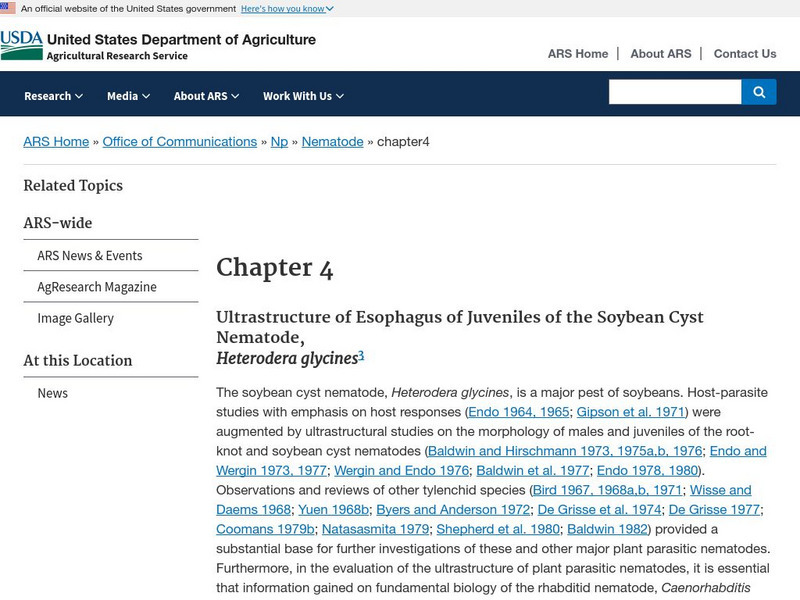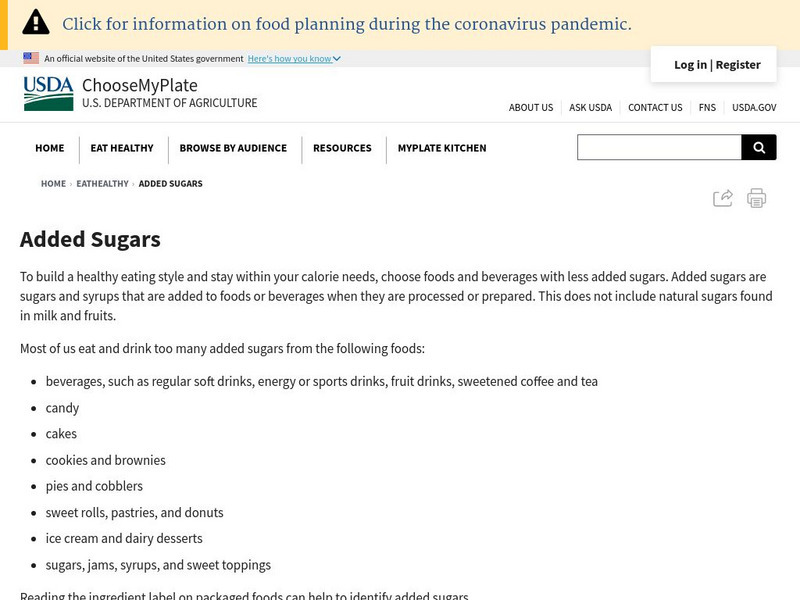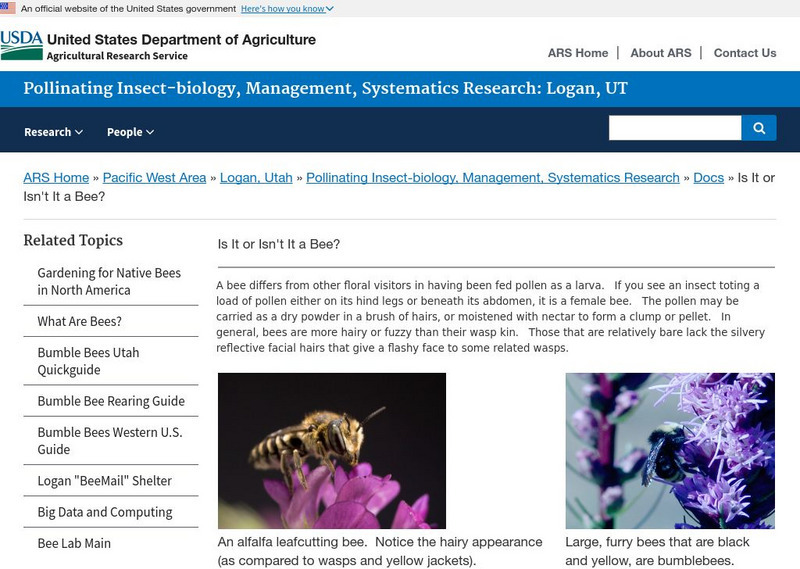US Department of Agriculture
United States Department of Agriculture: Ozone Spells "Ouch" for Some Plants
Ozone can damage plants and harm our lungs as well. Find out how in this this informative and interesting site.
US Department of Agriculture
United States Department of Agriculture: Ultrastructure of Esophagus
This site from the US Department of Agriculture provides brief notes on the structure of the esophagus and cell bodies of juvenile roundworms.
US Department of Agriculture
Usda Forest Service: Caribbean National Forest
Learn about El Yunque, the tropical rain forest in the Luquillo Mountains of Puerto Rico. The article discusses the topography, geology, rainfall amounts, soil, and water quality of the forest.
US Department of Agriculture
Usda Forest Service: Ozark St. Francis National Forests
Discover the Ozark and St. Francis National Parks, both located in the Ozark Mountains.
US Department of Agriculture
Nrcs: Web Soil Survey
Mapping the earth's soils can help us understand how the land can be used. Find out how to use soil characteristics obtained through soil surveys to create a soil map. Learn about the methods of soil mapping including digital soil mapping.
US Department of Agriculture
Choose My Plate: What Are Oils
This website defines "oils" and provides examples. It also names some of the uses for oils as well as sources.
US Department of Agriculture
Choose My Plate: All About the Protein Group
Read about the foods that qualify as proteins and how much amounts to one serving of each.
US Department of Agriculture
Choose My Plate: What Is Physical Activity?
This website provides a brief definition of "physical activity" as well as examples of "moderate physical activities" and "vigorous physical activities."
US Department of Agriculture
Choose My Plate: Tips for Increasing Physical Activity
Learn how to "make physical activity a part of the day." This brief article suggests incorporating simple and fun activities into your daily routine while at home, at work, and at play. Includes great tips for people of all ages.
US Department of Agriculture
Choose My Plate: How Many Calories Does Physical Activity Use?
This website has a chart showing how many calories a 154-pound, 5'10" male will burn while participating in various physical activities including hiking, walking, and swimming.
US Department of Agriculture
Choose My Plate: How Much Physical Activity Is Needed?
Learn how much physical activity you should partake in every day in order to maintain good health and weight in this brief essay. Also learn when it is necessary to consult your physician before starting a physical activity routine.
US Department of Agriculture
Choose My Plate: What Are "Solid Fats"?
Find out that examples of solid fats are butter and beef tallow. Learn about foods that are high in solid fats, and learn what solid fats contain that can negatively affect your health.
US Department of Agriculture
Choose My Plate: What Are "Added Sugars"?
In addition to providing a definition of "added sugars," this website includes examples of foods that contain added sugars and different names for added sugars that you can find while reading food labels.
US Department of Agriculture
Choose My Plate: Why Is It Important to Consume Oils?
Learn about certain types of fats and oils that are important to your health. This website provides a brief explanation of the nutrition and calories in polyunsaturated and monounsaturated fats.
US Department of Agriculture
United States Department of Agriculture: Timeline
This Agricultural Research Service page provides a timeline of major events in the history of the U.S. Department of Agriculture. Includes mention of the Morrill Land-Grant College Act and the creation of the USDA.
US Department of Agriculture
Agricultural Research Service: Salmonella Uses Chemical to Communicate
This site from the Agricultural Research Service cites a study that has found that Salmonella bacteria release a chemical that directly affects the growth of microorganisms. (January 27, 2000)
US Department of Agriculture
Us Department of Agriculture: Is It or Isn't a Bee?
This informative site takes a look at other insects that look like bees but in fact are not. Physical traits and characteristics are commented on for comparison purposes.
US Department of Agriculture
Agricultural Biotechnology
This discusses the role of the USDA in terms of Biotechnology.
US Department of Agriculture
The United States National Arboretum: Basic Plant Requirements
Site provides a brief description of some of the environmental parameters that influence plant growth.
US Department of Agriculture
Economic Research Service: Connecticut
This site provides a state fact sheet on Connecticut from the U.S. Department of Agriculture. You will find information on the population, farm characteristics, and top commodities and exports.
US Department of Agriculture
Us Department of Agriculture: Sci4 Kids: Build a Mite Construction Site
This interesting site provides not only factual information about mites and but also fascinating electron microscope photos. You can also create your own 3-D box photo of a female mite.
US Department of Agriculture
U.s. Department of Agriculture: Kids Food Critic Activity
In this fun game, kids get to pick a new food at the grocery store, taste it, and rate it like a food critic.
US Department of Agriculture
Choose My Plate: How Are Oils Different From Solid Fats?
This website provides a brief paragraph explaining the difference between oils and solid fats. Also includes information on how certain fats are linked to health problems.
US Department of Agriculture
Choose My Plate: Vegetarian Choices in the Protein Food Group
Here a few tips to help vegetarians get enough protein by eating beans, nuts, and soy products from the meat group. Includes a link to a page on how vegetarians can eat from the food pyramid and get the nutrients they need to stay healthy.














